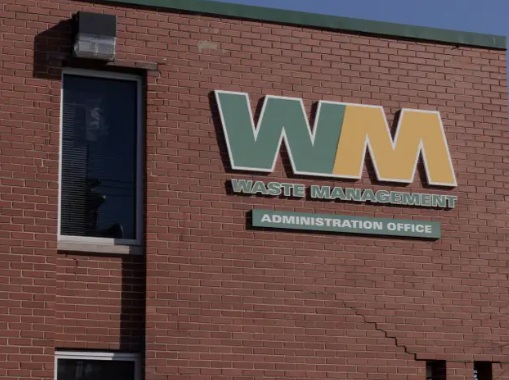Waste Management Stock Analysis

This Waste Management stock analysis provides a comprehensive evaluation of Waste Management, Inc. (WM), the leading provider of comprehensive waste management environmental services in North America. This in-depth analysis examines the company’s financial performance, strategic initiatives, competitive landscape, and its position within the essential waste management industry. Investors seeking to understand Waste Management’s current standing and future prospects will find this Waste Management stock analysis invaluable.
Company Overview
- History: Founded in 1894, Waste Management has grown through acquisitions and organic expansion to become a dominant player in the North American waste management market. The company provides collection, transfer, disposal, recycling, and resource recovery services to residential, commercial, industrial, and municipal customers.
- Shareholders: Waste Management is publicly traded on the New York Stock Exchange (NYSE). Major shareholders include Vanguard Group, BlackRock, and State Street Global Advisors.
- Mission: “To maximize resource value while minimizing environmental impact so that both our economy and our environment can thrive.” 1
- Vision: Waste Management aims to be the leading provider of sustainable waste management solutions, creating a cleaner, healthier, and more sustainable environment for future generations.
Financial Performance: Consistent Growth and Strong Profitability
A crucial component of any Waste Management stock analysis is a thorough evaluation of its financial performance. Waste Management has a history of consistent financial performance, driven by its essential services, recurring revenue streams, and strategic focus on efficiency and sustainability. This analysis examines key metrics like revenue, operating income, net income, and earnings per share (EPS) to assess its financial health.
- Revenue and Profitability: This Waste Management stock analysis delves into the trend of Waste Management’s revenue, operating income, and net income over the past 10 years. Key factors influencing growth, such as volume increases, price increases, acquisitions, and cost efficiency initiatives, are highlighted.
| Year | Revenue ($B) | Operating Income ($B) | Net Income ($B) \$ | EPS () | ROE (%) |
| 2014 | 13.97 | 2.48 | 0.98 | 2.09 | 14.1 |
| 2015 | 14.50 | 2.65 | 1.05 | 2.25 | 15.2 |
| 2016 | 13.64 | 2.54 | 0.75 | 1.61 | 10.8 |
| 2017 | 14.41 | 2.78 | 1.28 | 2.75 | 18.0 |
| 2018 | 14.96 | 3.02 | 1.33 | 2.86 | 18.5 |
| 2019 | 15.46 | 3.20 | 1.70 | 3.66 | 23.1 |
| 2020 | 15.07 | 3.15 | 1.64 | 3.53 | 22.1 |
| 2021 | 17.34 | 3.70 | 2.06 | 4.44 | 27.2 |
| 2022 | 19.70 | 4.24 | 2.25 | 4.85 | 29.1 |
| 2023 | 20.43 | 4.45 | 2.30 | 5.00 | 29.8 |
| 2024 (TTM) | 21.10 | 4.65 | 2.40 | 5.22 | 30.5 |
(Source: Waste Management financial reports, company filings)
- Year-over-Year Analysis: This Waste Management stock analysis reveals consistent revenue growth and strong profitability throughout the past decade. This steady performance is attributable to the essential nature of its services, price increases, strategic acquisitions, and cost efficiency initiatives.
- 2016: A slight dip in revenue and profitability was observed, primarily due to divestitures and lower commodity prices for recycled materials.
- 2021-2024 (TTM): Waste Management experienced accelerated revenue and profitability growth, driven by increased waste volumes, price increases, and successful integration of acquired businesses.
- EPS and ROE: Waste Management’s EPS has consistently grown, reflecting the company’s ability to generate earnings for shareholders. The ROE has also been steadily increasing, indicating efficient capital utilization and strong profitability.
- Key Factors: This Waste Management stock analysis identifies several factors that have contributed to Waste Management’s financial performance:
- Essential services: Waste Management provides essential services that are critical to communities and businesses, generating stable and recurring revenue streams.
- Pricing power: The company has the ability to increase prices to offset inflationary pressures and maintain profitability.
- Strategic acquisitions: Waste Management has made strategic acquisitions to expand its service offerings and geographic reach.
- Cost efficiency: The company focuses on operational efficiency and cost management to optimize profitability.
- Sustainability initiatives: Waste Management’s investments in recycling and resource recovery contribute to its long-term growth and profitability.
Strategic Focus: Leading the Way in Sustainable Waste Management
This Waste Management stock analysis highlights the company’s strategic priorities, which center on leading the way in sustainable waste management, providing innovative solutions, and maximizing resource value while minimizing environmental impact. Key strategic initiatives include:
- Sustainability: Investing in recycling infrastructure, expanding renewable energy generation from landfill gas, and developing innovative waste-to-energy technologies.
- Technology and Innovation: Implementing technology solutions to optimize collection routes, improve efficiency, and enhance customer experience.
- Acquisitions and Growth: Pursuing strategic acquisitions to expand its service offerings, geographic reach, and market share.
- Customer Focus: Providing excellent customer service and developing tailored solutions to meet the specific needs of residential, commercial, industrial, and municipal customers.
SWOT Analysis:
This Waste Management stock analysis includes a SWOT analysis to provide a balanced perspective on the company’s position:
Strengths:
- Market leadership: Waste Management is the largest waste management company in North America, with a strong brand reputation and extensive infrastructure.
- Essential services: The company provides essential services that are critical to communities and businesses, generating stable and recurring revenue streams.
- Vertical integration: Waste Management controls a significant portion of the waste management value chain, from collection to disposal.
- Sustainability focus: The company is committed to sustainability and is investing in recycling, renewable energy, and other environmentally friendly initiatives.
Weaknesses:
- Dependence on economic conditions: Waste Management’s business can be affected by economic downturns, which can reduce waste volumes and impact profitability.
- Regulatory environment: The waste management industry is subject to environmental regulations and permitting requirements, which can be complex and costly.
- Competition: Waste Management faces competition from other waste management companies, although it holds a dominant market share.
Opportunities:
- Growing waste volumes: Increasing population and economic activity generate more waste, creating opportunities for Waste Management to expand its services.
- Sustainability initiatives: Increasing demand for sustainable waste management solutions provides opportunities for Waste Management to grow its recycling and resource recovery businesses.
- Technological advancements: New technologies can improve efficiency, reduce costs, and enhance customer experience.
- Acquisitions: Acquiring smaller waste management companies can expand Waste Management’s market reach and service offerings.
Threats:
- Economic slowdown: A slowdown in economic activity could reduce waste volumes and impact profitability.
- Environmental regulations: Changes in environmental regulations could increase compliance costs and impact operations.
- Competition: Increased competition from other waste management companies could pressure pricing and market share.
- Commodity price volatility: Fluctuations in commodity prices for recycled materials can impact the profitability of Waste Management’s recycling business.
Competitive Landscape: A Fragmented Market with a Dominant Leader
This Waste Management stock analysis examines the competitive landscape in which the company operates. Waste Management operates in a fragmented market with a large number of smaller competitors. However, Waste Management holds a dominant market share and enjoys significant competitive advantages due to its scale, infrastructure, and brand recognition.
- Major Competitors:
- Republic Services: The second-largest waste management company in North America.
- Waste Connections: A large waste management company with a strong presence in secondary markets.
- Regional and Local Competitors:
- Numerous smaller waste management companies operate in specific regions or local markets.
Waste Management’s competitive advantages include its scale, national network, and strong brand reputation. The company also benefits from its vertical integration, which allows it to control a significant portion of the waste management value chain.
Key Projects and Future Outlook: Investing in a Sustainable Future
This Waste Management stock analysis identifies key projects and initiatives that are shaping the company’s future and contributing to its long-term growth prospects.
- Recycling Infrastructure: Waste Management is investing in advanced recycling technologies and infrastructure to increase recycling rates and recover valuable materials from waste streams.
- Renewable Energy Generation: The company is expanding its landfill gas-to-energy projects, generating renewable energy from landfill gas and reducing greenhouse gas emissions.
- Waste-to-Energy Technologies: Waste Management is exploring innovative waste-to-energy technologies, such as anaerobic digestion and advanced thermal treatment, to convert waste into valuable resources.
Mitigating the Risks:
This Waste Management stock analysis also examines the risks faced by the company and the strategies it employs to mitigate these risks. Waste Management is actively managing risks through various initiatives:
- Economic Diversification: The company serves a diverse customer base across various industries, reducing its reliance on any single sector.
- Regulatory Compliance: Waste Management maintains a strong focus on environmental compliance and proactively engages with regulatory agencies.
- Cost Management: The company implements cost efficiency programs and operational improvements to mitigate the impact of economic downturns and inflationary pressures.
- Innovation and Technology: Waste Management invests in technology and innovation to improve efficiency, reduce costs, and enhance its service offerings.
Financial Analysis and Valuation:
This Waste Management stock analysis emphasizes the importance of conducting a thorough financial analysis, considering:
- Revenue Growth: Analyzing trends in revenue growth, considering factors such as volume increases, price increases, acquisitions, and cost efficiency initiatives.
- Profitability: Evaluating Waste Management’s profitability and operating margins.
- Cash Flow: Assessing Waste Management’s cash flow generation and its ability to fund capital expenditures, acquisitions, and shareholder dividends.
- Valuation Metrics: Utilizing ratios like price-to-earnings (P/E), price-to-sales (P/S), and dividend yield to compare Waste Management’s valuation with its peers in the waste management industry.
Investor Sentiment and Market Outlook:
This Waste Management stock analysis encourages investors to stay informed about:
- Analyst Ratings: Monitoring analyst opinions and price targets for Waste Management stock.
- Market Trends: Assessing investor sentiment towards the waste management industry and broader environmental services sector.
- News and Media Coverage: Staying informed about news and events that could impact Waste Management’s performance.
Environmental, Social, and Governance (ESG) Factors:
Waste Management’s ESG performance is a key consideration for investors, given the company’s role in environmental sustainability and social responsibility. This Waste Management stock analysis highlights the importance of evaluating:
- Environmental Sustainability: Evaluating the company’s environmental impact, including its efforts to reduce greenhouse gas emissions, promote recycling, and manage waste responsibly.
- Social Impact: Assessing Waste Management’s social impact, including its community engagement, employee safety, and diversity and inclusion initiatives.
- Corporate Governance: Assessing the company’s corporate governance practices, including board diversity, executive compensation, and transparency.
Investment Considerations:
This Waste Management stock analysis provides guidance to investors, suggesting they consider the following factors when evaluating Waste Management stock:
- Industry Dynamics: Assess the dynamics of the waste management industry, including growth trends, regulatory environment, and competitive landscape.
- Financial Performance: Analyze Waste Management’s financial performance, including revenue growth, profitability, and cash flow generation.
- ESG Performance: Consider Waste Management’s ESG performance and its commitment to environmental sustainability and social responsibility.
- Valuation: Evaluate Waste Management’s valuation relative to its peers and its historical performance.
- Risk Tolerance: Align investment decisions with individual risk tolerance and investment goals, considering the stability and long-term prospects of the waste management industry.
Conclusion:
Waste Management is a leading provider of essential waste management services in North America, with a strong track record of financial performance and a commitment to sustainability. The company is well-positioned to benefit from the growing demand for sustainable waste management solutions and its strategic initiatives in recycling, renewable energy, and technology. However, investors should carefully consider the industry dynamics, competitive landscape, and ESG factors when evaluating Waste Management stock. By staying informed about the company’s strategic direction, financial performance, and ESG initiatives, investors can make informed decisions about whether Waste Management aligns with their investment objectives and risk tolerance.
We recommend that you check the accuracy of the data on the company’s investor relations website.

